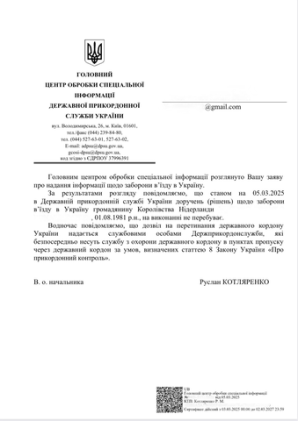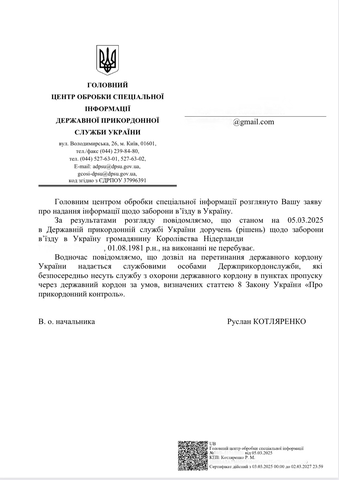Top 10 questions about entry bans to Ukraine
Cost of services:
Reviews of our Clients
... our work on joint projects assured us of your high level of professionalism
The topic of entry bans to Ukraine always raises many emotions, rumors, and questions. Some believe that the issue can be resolved in a single day for a fee, while others think it is permanent and that there is no chance of returning.
Let’s sort out what is true and what is a myth. In this publication, our migration lawyer answers the top 10 questions most frequently asked by clients.
Entry Ban to Ukraine: Answers to the Most Common Questions
Let’s start with the most common question: What are the main grounds for an entry ban to Ukraine? We have already covered this topic in detail in a separate article.
In short, according to migration law practice, entry bans are usually linked to minor violations or procedural misunderstandings. The most frequent reason is overstaying the permitted period of stay, either on a visa or under the visa-free regime (90 days within 180 days). Other common reasons include document issues such as expired passports, visas, or temporary residence permits, as well as failure to register one’s place of residence on time.
Another frequent cause is non-compliance with decisions of state authorities or failure to pay fines. Such violations often result in an entry ban, and many people only discover the problem at the border, finding themselves in a difficult situation.
However, clients often ask other equally important questions that also deserve separate attention.
Question 1: Can an entry ban be lifted “through connections” or “for money”?
Answer: The decision to impose an entry ban is made by government authorities such as:
- The State Migration Service
- The Security Service of Ukraine
- The State Border Guard Service
Information about the entry ban is sent to the Main Center for Processing Special Information of the State Border Guard Service of Ukraine and entered into the unified national database of the Border Guard Service.
The only legal way to lift an entry ban and remove information from the Border Guard Service database is to obtain an official court decision or a decision from the state authority that initially imposed the ban confirming its cancellation.
Please note! Any unofficial or “gray” schemes are not only illegal but often result in even harsher consequences. Always act through official procedures to protect yourself and your right to stay in Ukraine legally.
Question 2: For how long is an entry ban imposed? Can it be lifelong?
Answer: The duration of an entry ban depends on the reasons for its imposition and the authority that made the decision. The legal acts governing this issue clearly define the possible terms, and none of them include the concept of a “lifelong” ban.
In most cases, the decision to impose an entry ban to Ukraine is made for a period of three years.
If a foreign national fails to comply with the entry ban decision, they may be prohibited from entering Ukraine for ten years. This term is added to the remaining duration of the initial ban.
However, in many cases the ban can be appealed or its duration reduced if the decision was made with violations or if the grounds for the ban no longer exist.
You might also like: Entry Ban to Ukraine Due to Fines: What Violations Lead to Problems at the Border
Question 3: If I did not receive an official notice, can I still enter Ukraine?
Answer: No. It is important to understand that the key factor is not whether you received the notice but whether the information about the entry ban is recorded in the Border Guard Service database. The notice may simply not reach you if you are abroad.
Even if you have never seen the official document, you will be informed of the decision at the border and denied entry to Ukraine.
A person’s presence is not required for the decision to impose an entry ban, which is why many foreigners only learn about the restriction when they are stopped at the border.
Practical advice: If you suspect that you might have violated the rules of stay, check your status in advance and consult a lawyer. This will help you avoid an unpleasant situation where your plans are disrupted due to an unexpected refusal at the border.
Question 4: Does the court always lift an entry ban?
Answer: The court reviews the case materials and lifts the entry ban only if there are legal grounds, for example:
- the authority that imposed the ban violated the procedure;
- the decision was made without sufficient evidence;
- the reasons that previously justified the ban are no longer valid.
The court does not lift the ban “automatically.” Each case is considered individually, and competent legal support greatly increases the chances of a positive outcome.
Judicial practice shows that success directly depends on the quality of document preparation and the chosen defense strategy. Therefore, the experience of a migration lawyer plays a crucial role, as they can gather the necessary evidence, build arguments, and present your case to the court in the most convincing way.
Question 5: If I was denied entry at one border checkpoint, can I try entering through another one?
Answer: It’s not advisable. Information about entry bans is synchronized across all checkpoints, and every border crossing has access to the Border Guard Service database, which is used to check all foreign nationals. Therefore, it is impossible to “slip through” another border.
Of course, a “miracle” could happen in the form of a technical glitch or human error due to inattention, but relying on that is not worth the risk.
Even if such a situation occurs, once you have been informed of the entry ban at a previous checkpoint, that record is also logged in the database. Any attempt to bypass the ban only worsens the situation, as it is considered a failure to comply with a government decision and leads to an additional 10-year entry ban.
Therefore, even if a border guard at another checkpoint does not immediately notice the restriction, this does not make your entry legal. Instead of taking risks, it is better to act through official appeal procedures.
Question 6: Can an entry ban be lifted without being in Ukraine?
Answer: Yes, in most cases it can. To lift an entry ban, you need to contact a migration lawyer or attorney who will represent your interests in Ukraine and act on your behalf.
For example, you can issue a power of attorney, allowing the lawyer to act for you in court or before state authorities. Another option is to sign an agreement with a migration attorney. This is especially convenient if you cannot come to Ukraine in person because of the ban.
Question 7: Can I find out about an entry ban before traveling?
Answer: Yes, it is possible. An experienced migration lawyer can send an official request to the State Border Guard Service to check your current status. This helps you avoid situations where you discover the entry ban only at the border. In practice, such verification often saves clients time, travel expenses, and even protects them from reputational risks.
Question 8: What should I do if the reasons for my entry ban to Ukraine no longer exist?
Answer: If the circumstances that led to the entry ban have changed or been resolved (for example, you paid a fine, settled a debt, or obtained the required permit), you can initiate the procedure for an early cancellation of the ban. To do this, you must submit a well-prepared request to the state authority that made the decision to impose the ban.
You might also like: What to Do If You Are Banned from Entering Ukraine
Question 9: How long does it take to lift an entry ban?
Answer: The duration of the procedure to lift an entry ban to Ukraine directly depends on the reasons for the ban and the chosen method of appeal. If the issue is resolved administratively through the authority that imposed the ban, the process may take from a few weeks to several months.
Court proceedings usually take longer and may last several months. However, based on our practice, there are cases where the process can take more than a year.
Question 10: Can I enter Ukraine in transit if I have an entry ban?
Answer: No. The ban applies to any attempt to cross the border, even if you do not plan to stay in Ukraine and are only passing through in transit. The Border Guard Service is required to deny entry in all such cases.
Moreover, even attempting to “pass through in transit” can be considered a violation of the entry ban decision and may lead to stricter sanctions, including an extension of the restriction period.
Lawyer’s advice: If your travel route involves transiting through Ukraine and there is a risk that you may have an entry ban, check your status in advance.
How a Foreign National Should Act if Entry to Ukraine Is Banned: Lawyer’s Recommendation
An entry ban to Ukraine is a serious legal matter that requires a strictly lawful approach. Myths, “quick fixes,” or attempts to bypass the law can only make the situation worse. Here is what to do in such a case:
- Obtain official confirmation of the ban — this can be an extract from the database or a decision issued by the competent authority.
- Review the grounds for the ban together with a lawyer.
- Choose the method of appeal – administrative or judicial.
- Act promptly – the time frame for filing an appeal is limited.
If you find yourself in such a situation, it is important to act wisely, with a clear understanding of the procedure and legal options.
The migration lawyers at Pravova Dopomoga law firm provide comprehensive support, from verifying the grounds and preparing documents to representing clients in court or before state authorities.
Schedule a consultation to receive not only a lawful solution but also confidence in your legal protection.
Our clients





